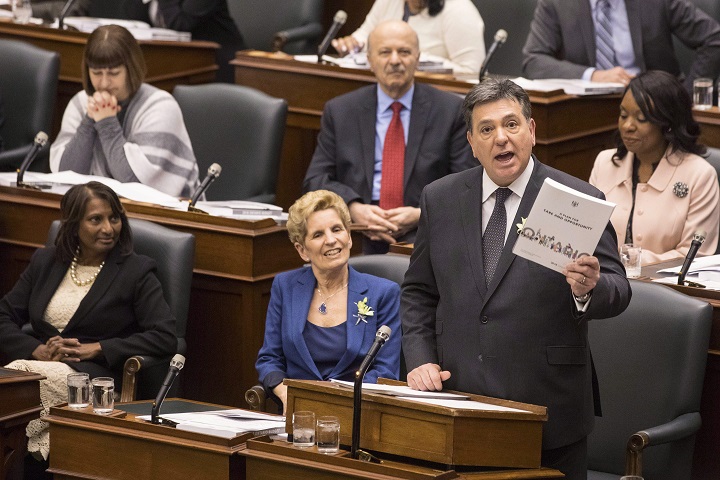A pre-election budget loaded with new spending has failed to bolster support for the Ontario Liberals, despite a positive response to several of its initiatives, an Ipsos poll commissioned by Global News suggests.

The poll, conducted last week, found that just 11 per cent feel the fiscal plan made them want to vote for the governing Liberal party in the upcoming June election.
On the other hand, 42 per cent said the budget makes them less likely to do so, and roughly half of those polled said it did not have an effect either way.
Thirty-three per cent said they oppose the budget more than the quarter of respondents who support it. Forty-one per cent said they don’t know enough about it to have an opinion.
“While many of the provisions contained within the budget individually are popular, as a package they fail to resonate with Ontarians primarily because most think that it’s not fiscally responsible, and it’s nothing more than a tactic or a ploy to try to buy their vote,” said Sean Simpson, Ipsos vice-president.
The result comes a day after Ipsos polling found that 40 per cent of decided voters support the Doug Ford-led Progressive Conservative party, while the Liberals and the New Democratic Party are statistically tied at 27 per cent and 28 per cent, respectively.
Following the March 28 budget, support for the Liberals has dropped by five points, according to Ipsos.
The plan included billions for childcare, a drug and dental plan, plus boosts for hospitals, seniors, mental health and more.

Get daily National news
As a result, Ontario is expected to run a $6.7-billion deficit this fiscal year and each year until 2024-2025.
WATCH: Ontario Budget 2018: Breaking down the Liberal fiscal plans for 2018-2019

The Ipsos poll found that when asked about particulars in the budget, the response was quite positive. The most widely supported initiatives were spending on hospitals (89 per cent) and a $2-billion, four-year commitment for mental health (84 per cent).
Just over half, 52 per cent, supported the plan to introduce free childcare for toddlers to pre-school aged children by 2020 at a cost of about $2.2 billion.
Overall impressions of the budget, however, were much less positive, the poll suggested. Eight in 10 respondents felt either strongly, or somewhat, that the the spending plan amounts to an attempt to “buy their vote.”
Forty-three per cent agree that the budget does a good job of addressing their top issues, along with 48 per cent agree that it helps those need it most.
However, 65 per cent disagreed that the budget does a good job in balancing investment with fiscal responsibility.
Ontarians are expected to head to the polls on June 7. Simpson said despite a double-digit lead for the Tories, even in the crucial Greater Toronto Area, a lot can happen in two months.
“We know that even in the last election, premier Wynne was unpopular going into that race. Now, she’s even less popular heading into this campaign, but she’s a fighter,” he said. “And on the other end of the spectrum, we’ve got Mr. Ford, who is a bit of a loose cannon.”
“We never know what he’s going to say or do that might cause his party to falter in the polls, but for now it seems that either he or his handlers have done a good job at keeping him out of the spotlight, which seems to be working.”
Exclusive Global News Ipsos polls are protected by copyright. The information and/or data may only be rebroadcast or republished with full and proper credit and attribution to “Global News Ipsos.”
This Ipsos poll on behalf of Global News was an online survey of 800 Canadians conducted between April 6 and 9. The results were weighted to better reflect the composition of the adult Canadian population, according to census data. The precision of Ipsos online polls is measured using a credibility interval. In this case, the poll is considered accurate to within plus or minus 4 percentage points, 19 times out of 20.











Comments
Want to discuss? Please read our Commenting Policy first.